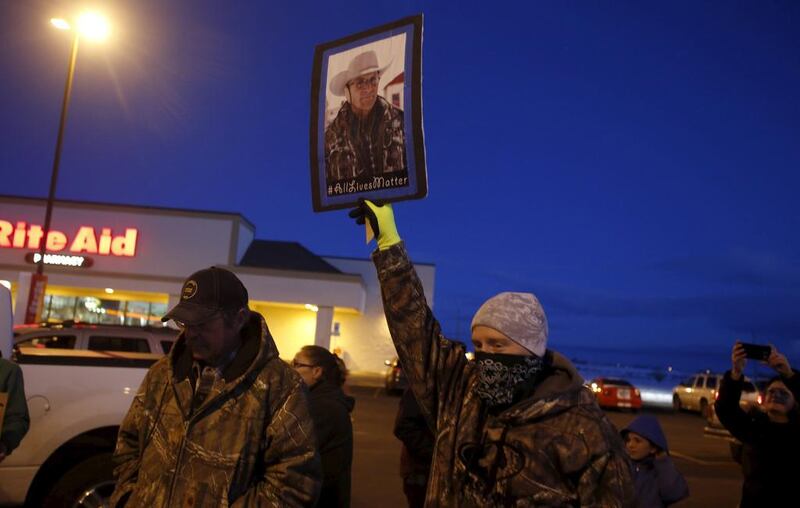When Timothy McVeigh detonated a truck bomb that killed 168 Americans in Oklahoma City in 1995, he claimed to be avenging white extremists killed by federal agents at Ruby Ridge and members of a religious cult who died during a government raid on their compound at Waco, Texas.
McVeigh hoped he would spur like-minded “patriots” to rise up and overthrow what he called a tyrannical federal government. No such rebellion materialised in 1995, but “patriots” who share his world view may have reason to believe conditions today are conducive to fulfilling their fantasy.
The election of America’s first black president in the same year that the financial collapse plunged millions more into poverty sparked an ammunition shortage in the nation’s gun stores. The same happened after Barack Obama’s reelection.
Hundreds of new white male “patriot” groups have emerged, their members brandishing semi-automatic rifles on the streets – outside mosques to intimidate Muslim worshippers, patrolling the border areas where migrants cross from Mexico, on the streets of Ferguson, where black protesters challenge racist policing, and in taking control of a state wildlife sanctuary in Oregon to protest against government land-use policy.
No modern state can survive without maintaining a monopoly of force within its territory. Legally permitting citizens to brandish weapons on the streets independent of government authority not only demonstrates the crumbling of state power, it raises the risk of bloody confrontations – and even civil war.
Last week’s debacle at the Malheur National Wildlife Refuge in Oregon, which had been occupied by a militia group, may have given the movement a new martyr, LaVoy Finicum, killed in a confrontation with the FBI.
Will there be new McVeighs seeking to avenge Finicum?
Perhaps, but the national political scene today is very different from 1995. Back then, Republicans recoiled from McVeigh and even dropped opposition to key gun-control laws. The party’s 1996 presidential candidate was Bob Dole, a Republican so moderate by today’s standards that his policy positions would be closer to those of Hillary Clinton.
A number of the contenders for this year’s Republican nomination actually echo McVeigh’s anti-government rhetoric, even if they called on the Oregon ranchers to stand down. Ted Cruz, for example, has told supporters that the constitution allows citizens to bear arms “as the ultimate check against governmental tyranny”.
Donald Trump’s campaign offers daily affirmation of the fact that a white nationalist rebellion has a well-established beachhead in national politics.
Mr Cruz and Mr Trump are channelling the rage and despair of white working class Americans whose real incomes have steadily declined since the onset of the Reagan era. Even under Bill Clinton and Mr Obama, healthy economic growth has masked growing social inequality and decline of living standards for the majority. The symptoms can be shocking: a Princeton University study published last November chronicled an almost 50 per cent spike during the first decade of this century in suicides among middle-aged white men without college education – a morbid statistic many analysts attributed to mounting economic despair.
That economic despair has been exploited by political entrepreneurs cultivating a burgeoning white working-class rage, with narratives that attribute their plight to the country’s first black president and his “socialist tyranny”.
Mr Trump’s insurgent campaign exemplifies this phenomenon, much to the consternation of the Republican Party establishment.
They want Jeb Bush or Marco Rubio to run against Hillary Clinton (presuming she sees off the insurgent challenge of socialist Bernie Sanders). But the Republican base, which starts the nominating process on Monday, looks more likely to pick Mr Trump or Ted Cruz.
That would probably mean another Democratic president – and a further escalation of the white nationalist rage at an America in which white people will soon be a minority.
The idea of a bombastic billionaire as the answer to the woes of the white working class may seem a little far fetched, but Mr Trump is a symptom of the fact that Americans – whether it’s black people under the gun from racist cops, progressive voters seeking a decent healthcare system and a good standard of living or white working class nationalists pining for a mythologised era of past greatness – are no longer looking to the traditional political system for redress.
Regardless of who wins in Iowa and in November, America can expect years of turbulence ahead.
Tony Karon teaches in the graduate programme at the New School in New York





